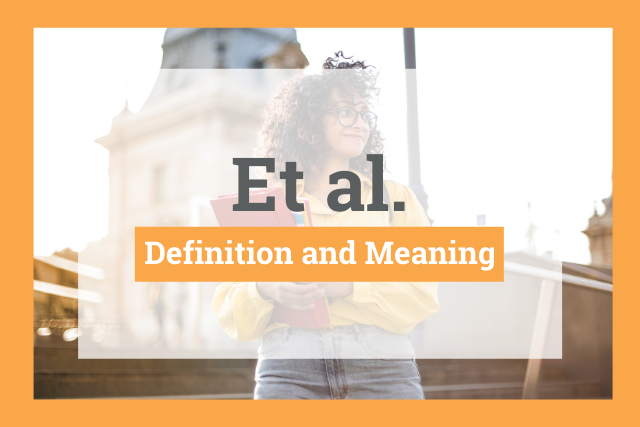
If you’ve read research-based articles or studies, academic papers, or other scholarly writing, you’ve probably seen the abbreviation et al. used, specifically after an author’s name, like this:
- The report, written by King et al., provides a meta-analysis of research on standardized tests in education.
In that sentence, and all others, et al. is a reference to other people. “King” is not the only author of “the report.” The et al. tells us that there were other contributors.
Et al. Definition
Et al. is an abbreviation that means “and others.”
Like many abbreviations, et al. has Latin roots.
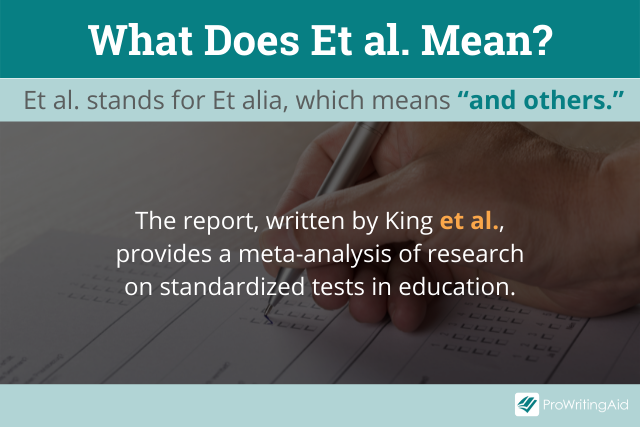
Et al. is an abbreviation for these Latin phrases. The phrases all mean “and others” but have distinctions based on the gender of the “others” referenced.
- Et alia, the neutral plural form
- Et alii, the masculine plural form
- Et aliae, the feminine plural form
In current usage, et al. is understood to abbreviate et alia, the neutral form of the Latin phrase.
Less commonly, et al. abbreviates et alibi, which means “and elsewhere.”
Et al. Meaning
The most common contexts for et al. are in-text citations, or bibliographical entries, or footnotes of scholarly writing. Authors, editors, or additional contributors to work are the “others” represented by et al.
The abbreviation avoids having to include extensive lists of authors or contributors in those contexts, and stands for two or more names.
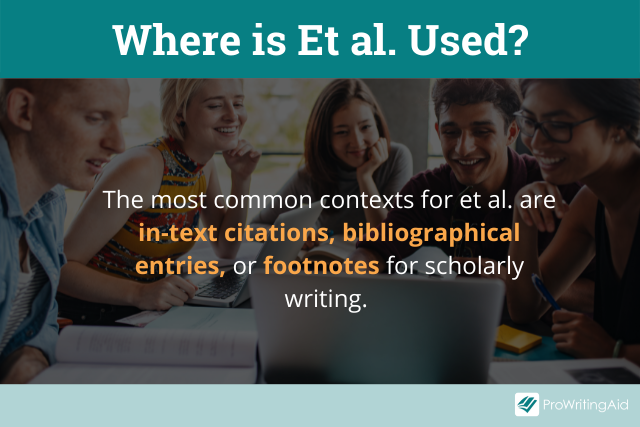
What Does Et al. Mean in a Citation?
When you see et al. in a citation, it means multiple authors, not just those specifically named in the citation, contributed to the work cited.
In the following APA formatted in-text citations, et al. shows that Johnson and Holmes were not the only authors of their respective traffic studies. The first example shows the APA in-text citation format without using a parenthetical. The second shows the format using a parenthetical citation.
The study completed in 2020 by Johnson et al. is more informative than the 2021 study completed by Holmes et al.
The original traffic study (Johnson et al., 2020) is more respected than the newer one (Holmes et al., 2021).
In MLA and APA style citations, when a work has three or more authors, include the name of the first author followed by et al.
In Chicago style, if a work has more than three authors, list the first three followed by et al.
All style guides are updated regularly and have different requirements for listing authors in a first citation and subsequent citations. Be certain to stay current with the style requirements.
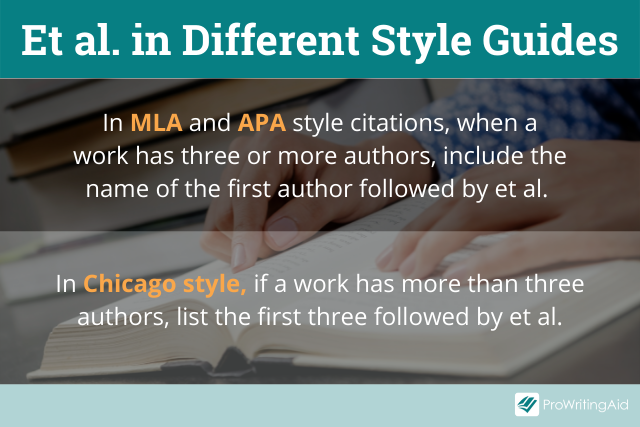
How to Use Et al. for Et Alibi
Use et al. to mean et alibi or “and elsewhere” when referring to locations. For example, if you’ve conducted business in a variety of countries, you could say:
- We have connections in Spain, Italy, Denmark, et al.
Though it is not common practice anymore, et al. (for et alibi), has been used at the end of footnotes to indicate that a passage or item appeared elsewhere in the text. For example, in a book explaining figurative language, an explanatory footnote might say:
- Examples of alliteration can be found in Carter (Famous American Poems, pp. 5, 16, 21, et al.)
How to Punctuate Et al.
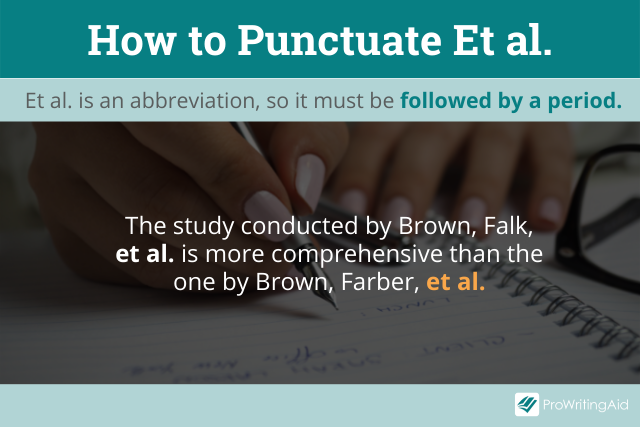
Et al. is an abbreviation, so it must be followed by a period. It does not have to be italicized, though some publications or style guides may have that requirement.
If you’re afraid you might forget to add that period, don’t worry. Running your work through ProWritingAid’s Realtime Report will catch the omission and remind you to add it.
Only place a comma before et al. when you’re including more than one name in your citation, such as when two or more cited works share the same author or have different authors who share the same last name. If you need punctuation after et al., keep the period and add that additional punctuation mark, such as the comma below:
- This study, which was conducted by Brown, Falk, et al., is the most comprehensive to date.
If et al. ends your question, add the question mark after the period, like this:
- What is the correct way to use et al.?
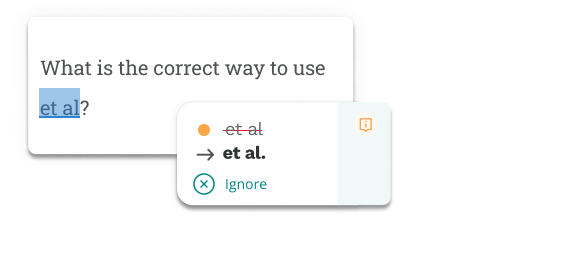
If et al. appears at the end of the sentence, do not add a second period.
In APA parenthetical citations, put a comma between et al. and the year of publication, like this:
- (Rice et al., 2016)
Et al. Usage
The most common context for et al. is scholarly works; however, you will find it in popular publications.
In these contexts, et al. still mainly represents people but sometimes represents names of other things, such as films or companies, that share a common purpose. For example, rather than list the names of all fast-food chains, a writer might say:
- Teens reported eating at Burger King, McDonald’s, Wendy’s, et al. three or more times per week.
Using et al. in social or professional interactions will sound awkward.
Imagine if someone asks you who is on your wedding invite list. You could say, “The Smiths, The Greens, Aunt Sue, et al.” but you might get a strange look in response! Saying “and a bunch of my other friends and relatives” is a better approach.
Similarly, et al. doesn’t fit the tone of professional email greetings. Emails usually start with Dear or Hello or Good Morning, professional yet friendly terms. Et al. doesn’t align with that professional, friendly email tone. Since et al. is not commonly used in greetings and may be unfamiliar to some of the email’s recipients, your “Dear Ellen et al.” greeting is likely to cause confusion.
Examples of Et al. in a Sentence
“As we are seeing, athletes these days compete longer: see Brady, Rodgers, et al.” —The New York Times, Bill Pennington, “Mikaela Shiffrin’s Alpine Career…”
“Great dish on the Kennedys, Bill Belichick, Mark Wahlberg, Cam Neely, et al.”—The New York Times, Sam Sifton “What To Cook Right Now.”

“The Neil Young row hinted at the precariousness of relying on Spotify et al. Could the casual CD become cool again?”—The Guardian, Larry Ryan, “Listen Here: You Can’t Rely on Music Streaming.”
“The class-action complaint, Zajonc et al. v. Electronic Arts, doesn’t contain any evidence for its claim, but that’s fairly typical for this sort of class-action complaint.” —Slate.com, Benjamin Frisch “A New Lawsuit…”
“...it’s hard to shake the suspicion that Toy Story 4’s creation was motivated less by a passion to further explore the lives of Woody, Jessie, Buzz Lightyear, et al., than by a passion to make another billion dollars.”—Slate.com, Dana Stevens, “The Best Part of Toy Story Four…”
Etc. vs Et al.
How is et al. different from etc.?
Et al., which means “and others,” refers to people or names.
Etc. is the abbreviation for the Latin phrase etcetera and means “and the rest” or “and so on.”
Etc. does not refer to specific people or names like et al. does, and is most often used in lists of things.
Follow etc. with a period, like all abbreviations. If it appears in the middle of a sentence and requires punctuation, put the mark after the period. If etc. appears at the end of the sentence, do not add a second period.
- The candy store had a great variety. They sold lollipops, chocolate, bubble gum, etc.
- We’re going to the beach, so gather your sunscreen, beach towel, sunglasses, etc.
- In contact sports, such as American football, basketball, boxing, etc., competitors have physical contact with one another.
- Etc. is more common and less formal that et al., so you’ll encounter and use this abbreviation more frequently.
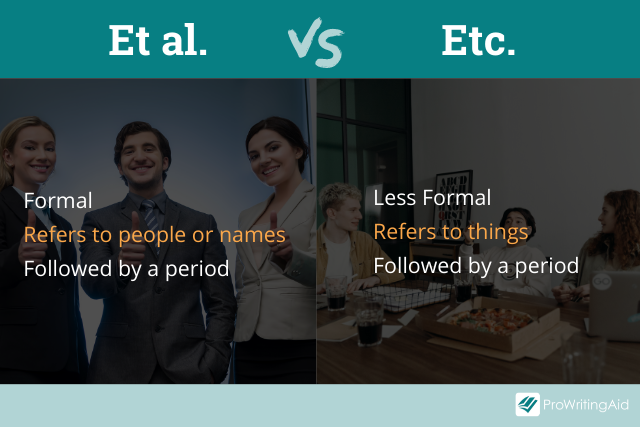
Conclusion on Et al.
The English language includes a variety of Latin abbreviations, and et al., an abbreviation of et alia, is one of them.
Et al. most frequently means “and others.” You’ll encounter the term most often in an in-text citation or bibliographic entry of scholarly writings, where it refers to other people or contributors.
However, popular publications also use et al. to avoid including a long list of names of other entities with shared characteristics, such as companies, films, or social media platforms.


